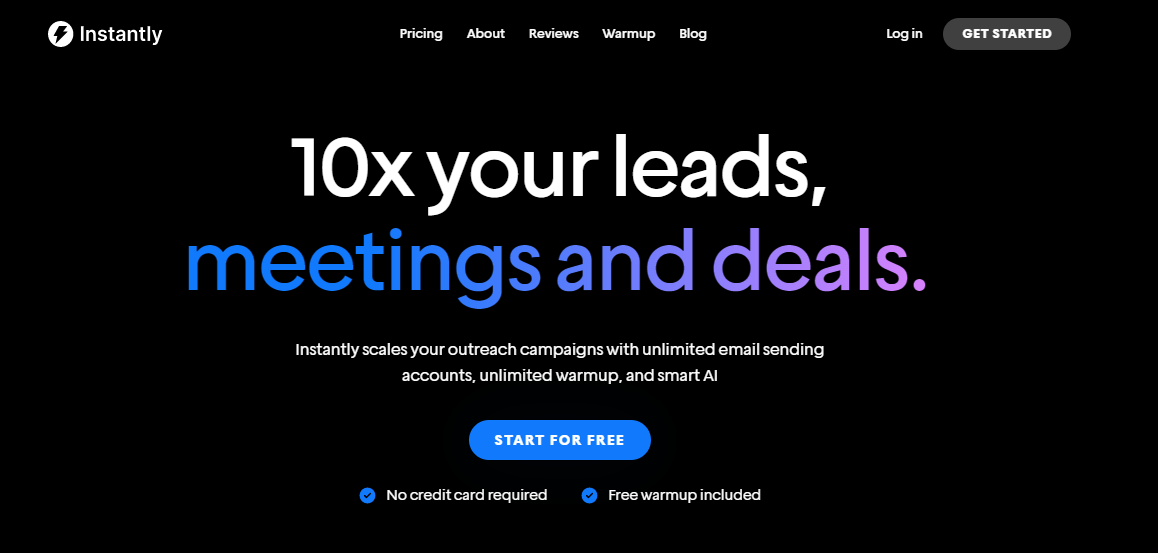In the highly competitive business landscape, generating and converting sales leads is crucial to fuel growth and success. There are a wide number of strategies to find, nurture, and develop sales leads. By understanding the potential of these strategies and incorporating them into your business's overall lead-generation strategy, you can develop your sales pipeline and drive results.
In this article, we’ll explore all facets of sales leads from their sources to how you’re able to maximize their generation:
- Introduction To Sales Leads
- Different Sources Of Sales Leads
- Maximizing Sales Leads: Effective Strategies For Lead Generation
- Email Marketing
Introduction To Sales Leads
Sales leads are the fuel that a business runs on. Each lead is a potential customer. Someone that has shown interest in your products and services and could potentially become a conversion, bringing valuable revenue to the business.
Without a consistent flow of leads, businesses struggle to grow and maintain revenue. For sales and marketing professionals, generating and nurturing sales leads is essential for maintaining a healthy pipeline and ensuring long-term success.

One of the primary reasons sales leads are vital to businesses is their ability to drive growth. A steady stream of leads enables businesses to identify potential customers, convert them into paying clients, and ultimately scale revenue growth. This consistent influx of new clients is necessary for businesses to thrive in a competitive marketplace.
Qualified sales leads can lead to improved sales efficiency. When sales teams are able to focus on qualified, hot leads they can allocate their time and resources more effectively. This in turn, increases the likelihood of closing deals and boosts overall sales performance. A focused sales team allows businesses to optimize their sales efforts and achieve better results.
Sales leads also enable better targeting and personalization in marketing and sales efforts. Understanding the demographics, preferences, and pain points of your leads allows for more targeted and personalized communication, which can result in higher conversion rates and increased customer satisfaction. This tailored approach can make a significant impact on your sales results.
Nurturing sales leads through personalized communications and providing value-added content can also foster customer loyalty and advocacy. Taking the time to build trust and brand loyalty means that businesses can turn one-time customers into long-term advocates. These are advocates who keep coming back for more and fall in love with your business. Many- often then spread the word about your products or services, resulting in even more leads.
Sales leads can provide a drive for innovation and product development. The sales process provides valuable feedback and insights into market needs and trends. Each new sales lead comes with attached data, and that data can help businesses adapt their offerings and stay ahead of the competition. Constant evolution is a necessary mindset for maintaining a strong market position and delivering relevant solutions to customers.
Lastly, sales lead data can inform strategic decision-making within a business. The analysis of sales data can help a business identify growth opportunities, refine its marketing strategy, and make informed decisions about resource allocation and investment priorities. Such a data-driven approach can lead to smarter choices and more robust growth in the long term.
Given the critical role that sales leads play in business success, companies should dedicate time and resources to develop a comprehensive lead generation strategy that leverages multiple channels and tactics, including cold sales outreach and email marketing.
Different Sources Of Sales Leads

There are various sources of sales leads, and the most effective methods for generating them can vary based on factors like industry, target audience, and business size. Some common sources of sales leads include:
- Organic search traffic: Users searching for solutions to their problems may discover your website or content through search engines.
- Social media: Sharing quality content and engaging on social media platforms with your followers can generate interest in your products or services.
- Content marketing: Creating valuable content that appeals to your target audience can attract leads who are interested in learning more.
- Paid advertising: Targeted ads on search engines or social media platforms can bring in new leads by placing your offerings in front of potential customers.
- Networking and events: Building relationships with other professionals at conferences or industry events can result in valuable connections and potential leads.
- Referrals and word-of-mouth: Satisfied customers often refer friends, family, or colleagues to businesses they trust, generating new leads.
Understanding the various sources of sales leads can help you craft a well-rounded lead-generation strategy that leverages multiple channels for maximum impact.
Maximizing Sales Leads: Effective Strategies For Lead Generation
Generating sales leads is an essential part of any business's growth strategy. By exploring and utilizing various tactics to reach your target audience, you can create a robust pipeline of potential customers.
Understanding Your Target Audience
High-quality sales leads come from having a clear understanding of who your audience is and what they like. That means your business needs to understand demographics, audience preferences, and pain points. If you know a great deal about them, then the more relevant your communication and content will be. Ideally, you'll already have a set of buyer personas to help guide you. If not it's time to research the market and analyze your existing customers.
Creating Valuable Content
People will come to your business through your content first. Some of the content you share will be the first interaction that people have with your business. When they're in the initial sales funnel stages, they'll be looking for valuable, informative, and engaging content. This is your opportunity to shine and prove your expertise. Do that and you'll quickly become a trusted advisor. The task at that point is to consistently deliver high-quality content. The best content will naturally drive organic traffic to your website, which in turn generates more leads and conversions.
Leveraging Social Media
It's no surprise that social media is an effective channel for generating sales leads. Your social media followers are some of your most engaged and active audience. Chances are they're in your target market, and you're able to specifically share value-driven content, participate in open discussions, and generally show that you are an engaged and active brand. For maximum effectiveness, you should use social media monitoring tools to identify conversations, trends, and potential leads in your industry, which you can then create content around or engage in.
Networking And Events
Attending industry events, conferences, and trade shows can provide valuable opportunities to connect with potential sales leads. These events enable you to network with other professionals, showcase your products or services, and gain exposure for your brand. To maximize the effectiveness of your networking efforts, prepare an elevator pitch, set goals for each event, and follow up with the connections you make. These events naturally help with building relationships, plus you can generate new leads and expand your network of potential customers.
Optimizing Your Website For Lead Generation
Everything comes back to your website. Emails, adverts, social posts, and almost all your communication and content lead back to your website. That means it has to be perfectly optimized for lead generation:
- Ensure that it's user-friendly, visually appealing, and easy to navigate.
- Incorporate clear calls-to-action, create dedicated landing pages for your marketing campaigns, and offer valuable resources in exchange for contact information, such as Ebooks or webinars.
- Implement conversion rate optimization techniques and use tools like heatmaps and A/B testing to refine your website's design and content.
Email Marketing For Sales Leads

Email marketing is a highly effective and versatile channel for generating and nurturing sales leads. With an effective strategy in place, email can help you to build and maintain relationships with potential customers. It's also a low-cost, accessible way to share valuable content and ultimately drive conversions.
The Advantages Of Email Marketing
Email marketing offers numerous benefits for lead generation, making it a popular choice among businesses across industries:
- Cost-effectiveness: Email marketing is an affordable way to reach a large audience, in fact when compared to other channels you'll find that email has one of the lowest costs per lead.
- High engagement: Email enables direct communication with your audience, fostering deeper connections and higher engagement levels.
- Easy customization: Email marketing platforms allow for easy personalization, segmentation, and targeting, which can help improve the relevance and effectiveness of your messaging.
- Measurable results: Email marketing tools provide detailed analytics and reporting, enabling you to track the success of your campaigns and optimize them for better performance.
- Scalability: More people join your list? No problem, simply scale the number of emails that you send. From 100 to 100,000, email is incredibly adaptable and scalable.
Building An Effective Email List
A strong email list is the foundation of any successful email marketing campaign. To build a high-quality list, encourage your visitors to sign up for your email list by providing exclusive content, discounts, or other valuable incentives. It's one thing to offer incentives, but you need to let people know that you actually have a list. You need to promote your email list across various channels, including your website, social media, and offline events. Don't ever be tempted to buy email addresses for your list, or simply add any email address you find.
Effective email marketing requires you to attract subscribers who fit your target audience and are genuinely interested in what you have to offer. This way, you'll increase the chances of engaging with them effectively and avoid wasting your time and resources on uninterested subscribers. It's important that you regularly maintain your email list by cleaning it, removing inactive subscribers, correcting typos, and updating contact information to ensure optimal deliverability and engagement.
Crafting Compelling Email Content
The content of your emails is what makes them engaging. Engaging content and emails naturally lead to more prospects and leads. It all starts with crafting attention-grabbing subject lines. These subject lines should encourage recipients to open your emails and pique their interest. One way of guaranteeing prospective customer engagement is to ensure your emails provide value to your subscribers. You can achieve this by addressing their needs, interests, or pain points, and using clear and concise language to effectively communicate your message.
Always finish your content with a call to action that guides the reader to the next step. This could be as simple as visiting your website, downloading a resource, or making a purchase. Remember to continuously test different email elements, such as subject lines, content, and design, to determine what resonates best with your audience and improves engagement.
Personalization And Segmentation
Personalizing and segmenting your email marketing campaigns can significantly improve their effectiveness. Take the time to tailor your content to specific audience segments, and you'll find that your relevance increases, as does your engagement. Take the information that you know about your subscribers, such as their location, industry, or job role, and use it to create more relevant content. Once you have this information, you can begin to segment or group, subscribers based on their interaction with your emails or website, such as their browsing history or purchase behavior.
The highest level of personalization will incorporate dynamic content that automatically adjusts based on each subscriber's preferences or behaviors. There's definitely a science to this process. You'll find that testing different personalization and segmentation strategies can help you refine your approach and maximize the impact of your email marketing campaigns.
Tracking And Analyzing Email Marketing Performance
Monitoring the performance of your email marketing campaigns is essential for optimizing their success and making data-driven decisions. You should track key metrics linked to your email marketing. These include open rates, click-through rates, and conversion rates. In isolation, these aren't necessarily all that helpful but put together, they paint a picture that helps you to gauge the effectiveness of your campaigns.
Once you have tracking in place, you're able to use this data to identify areas for improvement, test new strategies, and refine your messaging and targeting. Regularly monitoring and evaluating your email marketing performance is crucial to maximizing the effectiveness of your campaigns and driving successful lead-generation outcomes.
Key Takeaways
Generating sales leads isn’t a nice to have part of running a business, it’s completely mandatory for any business that is hungry for growth and development. Thankfully, there are multiple channels that you can explore, and strategies that you can tailor to your specific requirements. The key is to be consistent and productive in your approaches.
- Sales leads come in all shapes and sizes and from multiple different avenues.
- One of the best sources is email marketing.
- The more personalized your sales process the more successful you’ll be at converting leads.
If you’re looking for a robust, effective, and efficient email marketing tool to help bolster your sales lead generation strategy, then look no further than Instantly. Ready to give it a spin? It’s easy to get started in a matter of moments.





